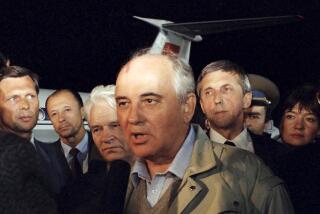Malenkov, Stalin’s Successor, Dead at 86 : Deposed Soviet Leader, Top Aide During Purge Era, Lived in Obscurity
- Share via
MOSCOW — Georgy M. Malenkov, who briefly succeeded Joseph Stalin as leader of the Soviet Union in 1953, has died, a government spokesman disclosed Monday.
Malenkov, who was 86, died about 10 days ago but his death was not announced earlier at the request of his relatives, according to Foreign Ministry spokesman Gennady I. Gerasimov.
Presumably deferring to his survivors’ wishes, there was no mention of Malenkov’s death on Soviet television news programs or in Monday’s editions of the major national newspapers, Pravda and Izvestia.
Despite the brevity of his time in power, he was one of only eight top Soviet leaders since the Bolshevik Revolution in 1917. Yet he lived for the last 30 years as he died--in obscurity.
A ‘True Disciple’
During the last years of Stalin’s rule, the diminutive, pudgy Malenkov was described as a “true disciple” of the dictator and seemed most likely to succeed to the top Kremlin post.
After Stalin’s death on March 5, 1953, Malenkov took Stalin’s position as premier and retained his membership in the Communist Party secretariat.
Working with Nikita S. Khrushchev, Malenkov removed Stalin’s chief of the secret police, Lavrenti P. Beria, from the Presidium, as the party Politburo was known at the time.
But Khrushchev, who quickly achieved supremacy in the party, forced Malenkov to resign as a party secretary within nine days after Stalin’s death. By September, 1953, Khrushchev was named first secretary of the Communist Party, the most powerful post, and Malenkov was removed from the lesser position of premier by February, 1955. Although he kept his seat on the Presidium, Malenkov was humiliated by being sent to manage a power station in the far-off Republic of Kazakhstan.
In another power struggle in June, 1957, Malenkov combined with others to form a majority in favor of Khrushchev’s ouster as leader. But Khrushchev assembled the members of the Communist Party’s Central Committee, which supported him in the showdown.
Malenkov and his allies, including former Foreign Minister Vyacheslav M. Molotov and Lazar M. Kaganovich, were later labeled “the anti-party group” and expelled from the Presidium.
Became Non-Person
Despite his former high position, Malenkov became virtually a non-person. His biography was dropped from the 1974 edition of the Great Soviet Encyclopedia. In 1975 he was reported to be living in Moscow on a pension and was occasionally seen on the streets.
Born Georgy Maksimilianovich Malenkov, on Jan. 8, 1902, in the town of Orenburg in western Siberia, he joined the Red Army during the civil war that followed the Bolshevik Revolution.
In 1920, he joined the Communist Party, serving as a political officer in the army, and later studied at Moscow High Technical School. He became an assistant to Stalin, working for the Central Committee secretariat starting in 1925 and, from 1934 to 1939, during Stalin’s purges, he headed the party’s Department of Higher Party Organs. The department, which no longer exists, had the job of supervising the purges.
He was elected a secretary of the Central Committee early in 1939 and, two years later, when the Germans invaded the Soviet Union, he was named one of the five members of the State Defense Committee, which was chaired by Stalin.
After the war, in 1946, he was named to the Politburo and became a deputy premier and second secretary of the party. As one of Stalin’s closest collaborators, he gave the main report at the party’s 19th Congress in 1952, standing in for Stalin.
More to Read
Sign up for Essential California
The most important California stories and recommendations in your inbox every morning.
You may occasionally receive promotional content from the Los Angeles Times.












